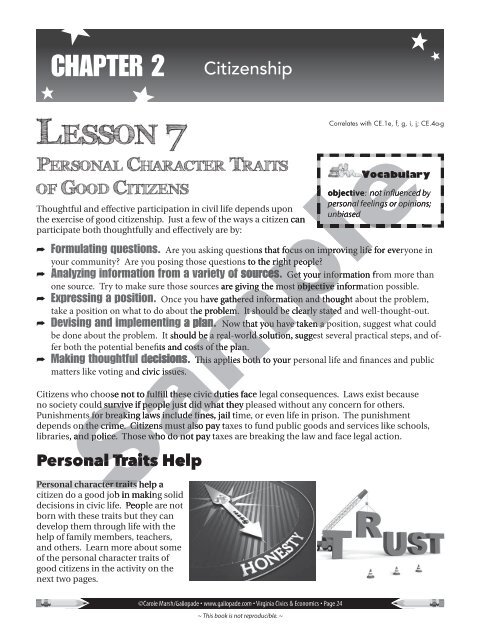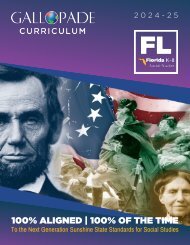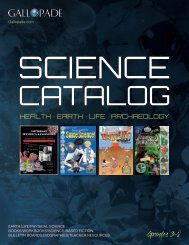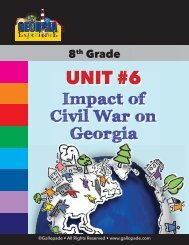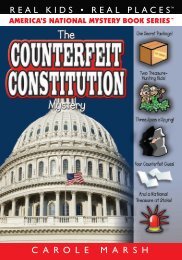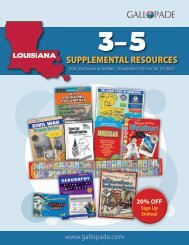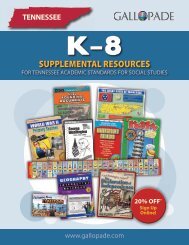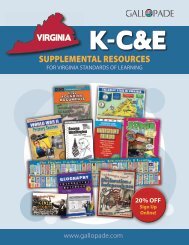Virginia Experience Civics & Economics Social Studies
The Virginia Experience effectively teaches students about United States history. All curriculum materials cover foundations of the U.S. government, citizenship, political process, understanding government, judicial system, public policy, economy, and finances as required by the Virginia Standards of Learning (SOL).
The Virginia Experience effectively teaches students about United States history. All curriculum materials cover foundations of the U.S. government, citizenship, political process, understanding government, judicial system, public policy, economy, and finances as required by the Virginia Standards of Learning (SOL).
Create successful ePaper yourself
Turn your PDF publications into a flip-book with our unique Google optimized e-Paper software.
CHAPTER 2<br />
Citizenship<br />
Lesson 7<br />
Correlates with CE.1e, f, g, i, j; CE.4a-g<br />
traitsSample<br />
PersonaL character traits<br />
Vocabulary<br />
oF good citizens<br />
objective: not influenced by<br />
personal feelings or opinions;<br />
Thoughtful and effective participation in civil life depends upon<br />
unbiased<br />
the exercise of good citizenship. Just a few of the ways a citizen can<br />
participate both thoughtfully and effectively are by:<br />
➦ Formulating questions. Are you asking questions that focus on improving life for everyone in<br />
your community? Are you posing those questions to the right people?<br />
➦ Analyzing information from a variety of sources. Get your information from more than<br />
one source. Try to make sure those sources are giving the most objective information possible.<br />
➦ Expressing a position. Once you have gathered information and thought about the problem,<br />
take a position on what to do about the problem. It should be clearly stated and well-thought-out.<br />
➦ Devising and implementing a plan. Now that you have taken a position, suggest what could<br />
be done about the problem. It should be a real-world solution, suggest several practical steps, and of-<br />
fer both the potential benefits and costs of the plan.<br />
➦ Making thoughtful decisions. This applies both to your personal life and finances and public<br />
matters like voting and civic issues.<br />
Citizens who choose not to fulfill these civic duties face legal consequences. Laws exist because<br />
no society could survive if people just did what they pleased without any concern for others.<br />
Punishments for breaking laws include fines, jail time, or even life in prison. The punishment<br />
depends on the crime. Citizens must also pay taxes to fund public goods and services like schools,<br />
libraries, and police. Those who do not pay taxes are breaking the law and face legal action.<br />
Personal Traits Help<br />
Personal character traits help a<br />
citizen do a good job in making solid<br />
decisions in civic life. People are not<br />
born with these traits but they can<br />
develop them through life with the<br />
help of family members, teachers,<br />
and others. Learn more about some<br />
of the personal character traits of<br />
good citizens in the activity on the<br />
next two pages.<br />
Sample<br />
Sample: not<br />
©Carole Marsh/Gallopade • www.gallopade.com • <strong>Virginia</strong> <strong>Civics</strong> & <strong>Economics</strong> • Page 24<br />
~ This book is not reproducible. ~


